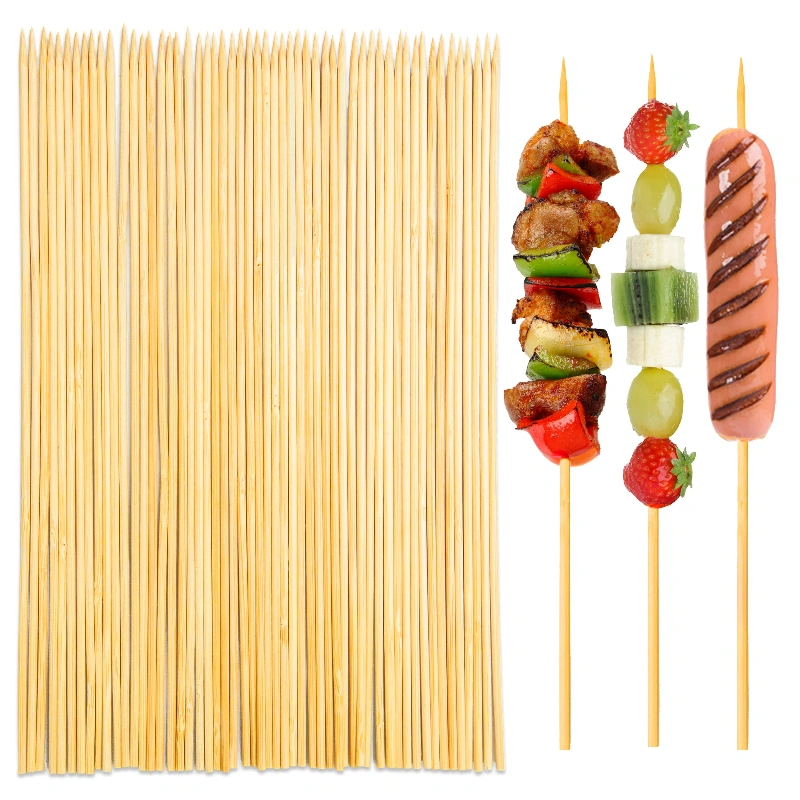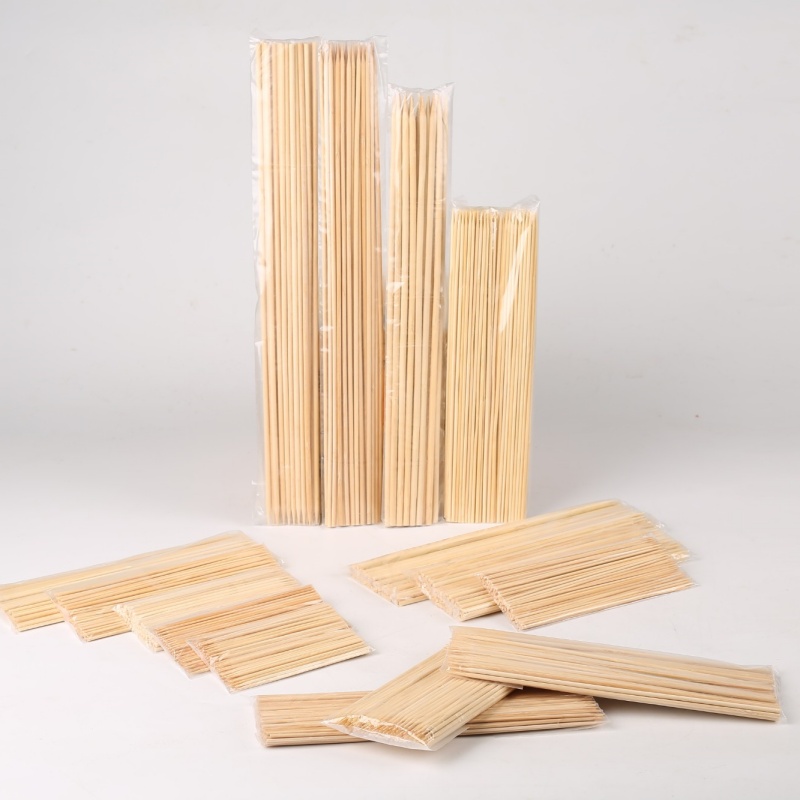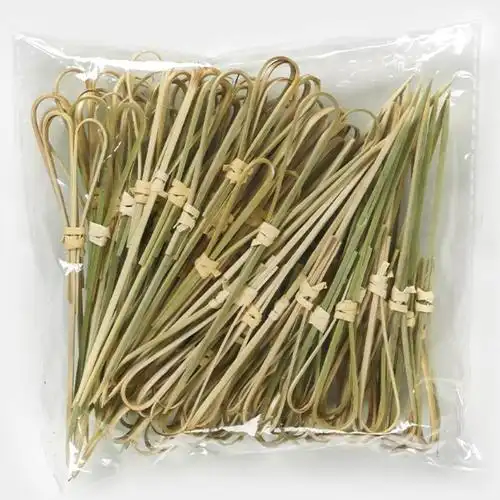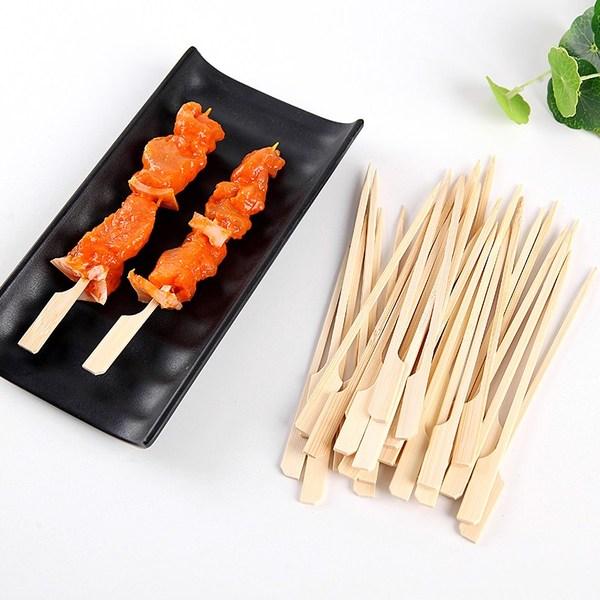Do You Need to Soak Brochetas de bambú?
Yes—soaking bamboo skewers before grilling is a non-negotiable step to ensure safety and optimal cooking results. This practice directly addresses one of the biggest risks of using bamboo skewers: burning and charring, which can ruin food, release unpleasant smoke, or even cause the skewer to break mid-cooking. Below is a detailed breakdown of why soaking is essential, how to do it properly, and extra tips to enhance its effectiveness.
1. Why Soaking Is Critical
Bamboo is a naturally dry, porous material—this makes it highly flammable when exposed to the high heat of a grill (typically 350–500°F/175–260°C). Without soaking:
- Rapid Burning: Dry skewers can ignite or char excessively within minutes, especially the thin, exposed ends. Burnt bamboo may impart a bitter, ashy taste to your food (e.g., kebabs, grilled veggies) and create unpleasant smoke that overwhelms the flavor of your ingredients.
- Skewer Breakage: Charred bamboo becomes brittle and prone to snapping. If a skewer breaks while cooking, your food can fall into the grill, leading to waste or uneven cooking.
- Reduced Durability: Dry skewers are also more likely to splinter when piercing food (e.g., tough meat or firm vegetables), increasing the risk of splinters in your hands or mouth. Soaking softens the bamboo slightly, making it more flexible and less prone to splitting.
2. How to Soak Brochetas de bambú Properly
Follow these steps to ensure your skewers are fully prepared:
- Use Cold Water: Submerge the skewers completely in a bowl or container of cold water. Cold water is absorbed more slowly and evenly by the bamboo, ensuring the entire skewer (not just the surface) becomes saturated.
- Soak for At Least 30 Minutes (Up to 2 Hours): 30 minutes is the minimum time needed to saturate thin skewers (3–4mm diameter). For thicker skewers (5mm or more) or skewers that have been stored in a dry environment (e.g., a pantry for months), soak them for 1–2 hours to ensure maximum water absorption.
- Weight Them Down (If Needed): Bamboo skewers are lightweight and may float to the surface of the water. To keep them fully submerged, place a heavy plate, bowl, or kitchen weight on top of the skewers. This ensures every part of the skewer gets soaked, not just the bottom half.
3. Extra Tips to Boost Soaking Benefits
For even better results, enhance your soaking process with these simple additions:
- Add Olive Oil: Stir 1–2 tablespoons of olive oil into the water. The oil coats the bamboo fibers, creating an extra barrier against heat and reducing charring. It also adds a subtle, pleasant flavor to the skewer (which can transfer slightly to your food, enhancing grilled veggies or meats).
- Add Vinegar or Lemon JuiceUn chorrito de vinagre blanco o jugo de limón ayuda a ablandar aún más el bambú, haciéndolo menos propenso a astillarse. Además, tiene propiedades antibacterianas suaves, lo que puede ayudar a reducir la posibilidad de bacterias en la superficie de la brocheta.
- No remojar demasiadoAunque el remojo es esencial, evite dejar las brochetas en agua durante más de dos horas. Un remojo excesivo puede ablandar y deformar el bambú, haciendo que se doble por el peso de los alimentos (por ejemplo, cubos de carne pesados) al asarlos.
4. ¿Qué pasa si te olvidas de remojar?
Si tienes prisa y te olvidas de remojar las brochetas, aquí tienes una solución rápida (aunque no es tan efectiva como remojarlas correctamente):
- Envuelva los extremos en papel de aluminioCorte pequeños trozos de papel aluminio y envuélvalos alrededor de los extremos expuestos de las brochetas (las partes que no sujetan la comida). Esto evita que el calor directo queme los extremos.
- Utilice fuego más bajoReduzca la temperatura de la parrilla a 150-175 °C (300-350 °F) y cocine las brochetas a fuego lento. Revíselas cada 1 o 2 minutos para evitar que se quemen.
- Nota: Esta es una solución temporalEstos pasos minimizarán las quemaduras, pero no evitarán que la brocheta se seque y se vuelva quebradiza. Para obtener resultados más seguros y con mejor sabor, remoje siempre las brochetas cuando sea posible.
Conclusión final
Remojo brochetas de bambú No es un paso opcional, es imprescindible para una parrillada segura y exitosa. Al empapar el bambú en agua fría de 30 minutos a 2 horas, evitará que se queme, reducirá las astillas y garantizará que las brochetas soporten el peso de la comida. Para mayor protección, añada un chorrito de aceite de oliva o vinagre al agua y vigile siempre las brochetas durante la cocción para ajustar el fuego según sea necesario.





